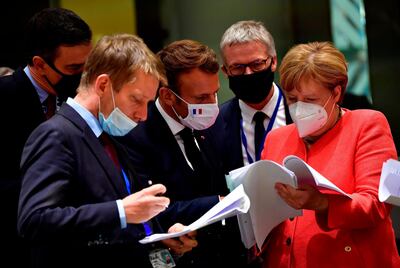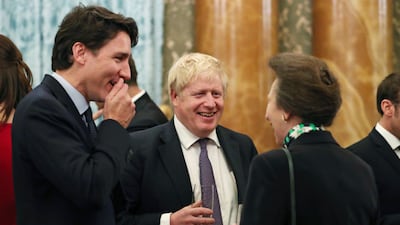At the end of what could be described as the "Year of Zoom", the leadership of the European Union fittingly sealed a landmark investment pact with China via video conference.
Something unusual occurred on Wednesday, when the call was joined by the Chancellor of Germany and the President of France. The imprimatur in-person of Angela Merkel and Emmanuel Macron, respectively, completed the continental bloc’s linkage with the Chinese economy. It was a moment that said that Germany and France really were in the driving seat for all 27 countries.
Henry Kissinger, the former US secretary of state, once asked who he should call if he wanted to talk to “Europe”. The answer now is a split line to Berlin and Paris.
On the same day the EU finished up the last bit of business from the old era: Charles Michel, President of the European Council, and Ursula von der Leyen, President of the European Commission, signed the free trade deal with the UK that should ensure a reasonably frictionless Brexit.
Power is about choices that demonstrate where it resides.
When UK Prime Minister Boris Johnson wanted to break the logjam of the Brexit talks earlier in December, he tried to reach over the head of Ms Von der Leyen. He wanted to engage directly with Mrs Merkel and Mr Macron.
Unlike the Chinese set-up, Mr Johnson’s call for direct talks was rebuffed. The common line ran through the EU offices in Brussels.
Because of its collective nature, the EU is often an opaque actor on the global stage. This is not a failure of communications. The countries of Europe have extremely able diplomats and plenty of resources available for communications.
The completion of the investment pact with Beijing concluded a long process of negotiations.
For Mrs Merkel, who is likely to step down in 2021, it was a cherished goal of her own endgame as a stateswoman. In her New Year message, Mrs Merkel spoke about how difficult this last period in office has been. She even said that it was the hardest of her 15 years in power.

Despite the arduous times, she can depart in triumph. Mr Macron is thereby well positioned to take over as de facto leader of the union, with the new German chancellor likely to give him the role of a senior statesman until the next French presidential election in 2022.
That means that Mr Macron has an opportunity in particular to shape European defence and foreign policy around French priorities. In policy terms, the implications are that a more decisive, better-resourced European framework will be built up in the coming years.
For US President-elect Joe Biden, these trends will shape how he rebuilds American diplomacy. Washington can no longer take the Europeans for granted – and there is no disguising this fact. The EU's investment deal with China was signed even though Jake Sullivan, Mr Biden's nominee for the position of national security adviser, went public with a plea for a rethink.
The Europeans, instead, rushed ahead to ensure that the agreement was completed during the transition period between the Trump and Biden administrations.
Joint action on climate change and a “Green Deal” will give the US and EU powerful synergies. But there are limitations ahead, not least because the Europeans will not always be able to – or want to – follow the US lead.
Internal tensions among the European states have been suppressed by the Covid-19 pandemic. And Washington is likely to find that there is a minefield to traverse as it engages with the bloc.
Open rifts will not be healed just by the shift from Donald Trump to Mr Biden. Neither side has a clear idea of how to patch up the divisions over Iran. The European expectations that the 2015 nuclear deal can be restored could be too optimistic.
The Biden administration is also unlikely to find it easy to rebuild the pre-eminent role for the Nato alliance in European security. Turkey took up the key command of Nato's rapid reaction force at the turn of the year. However, not only is Paris in an open feud with Ankara, but the French agenda of boosting the EU's defence capabilities points a sidelining of Nato over time.
This leaves the puzzle of where Britain will position itself. It is no longer in the EU so it cannot act as a firewall to protect Nato. Through Brexit, London risks slipping well down this priority list for whom the US president calls first in a crisis.
On the other hand, Britain aligns well with the new president. Its clear embrace of a green “build back better” agenda, globalist outlook and rising scepticism about the advantages of working in lockstep with Beijing are all in its favour.
With a more nimble foreign policy – London promises to remain an ally for Europe – Washington could find more momentum through co-operation with the British government.
For Mr Johnson, the challenge is to navigate Britain back to its traditional role alongside Europe – and not within it. With much depending on the trade-deal diplomacy that London engages post-Brexit, there is a potential foreign policy dividend for 10 Downing Street.
France and Germany have stepped to the plate of European leadership. For the outside world, especially the US but also Japan and Australia, the EU orientation’s may not be as useful as London’s positioning.
It would be a mistake to say that outright competition will dictate these relationships over the rest of the decade. At the same time, it is not a foregone conclusion that France and Germany will ensure that the EU is a go-to partner in the years ahead.
Damien McElroy is London bureau chief at The National










